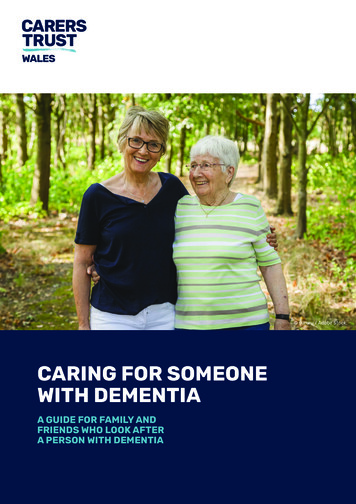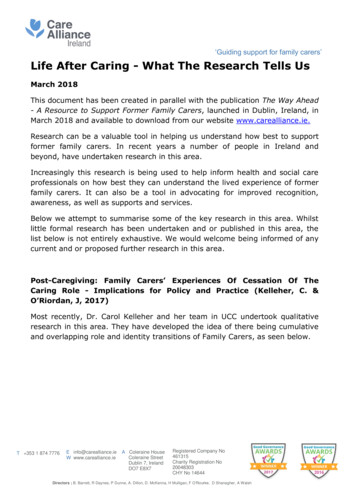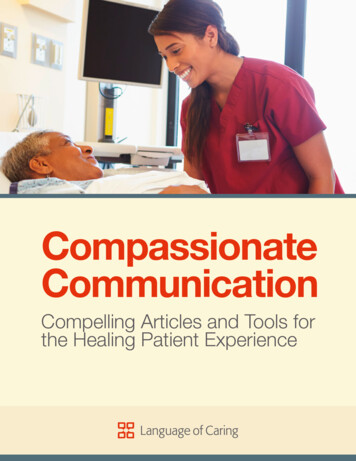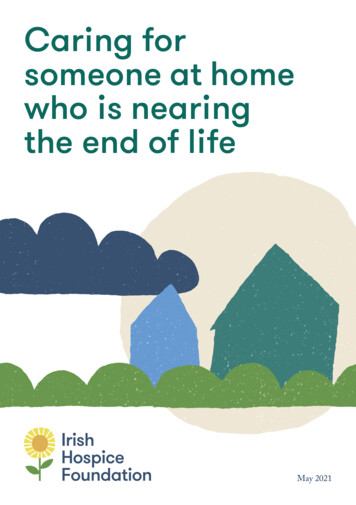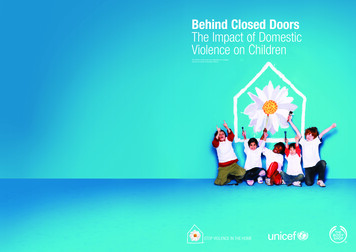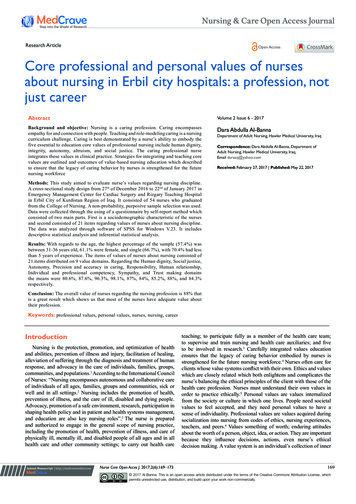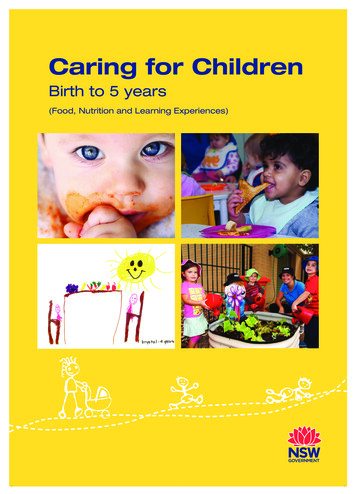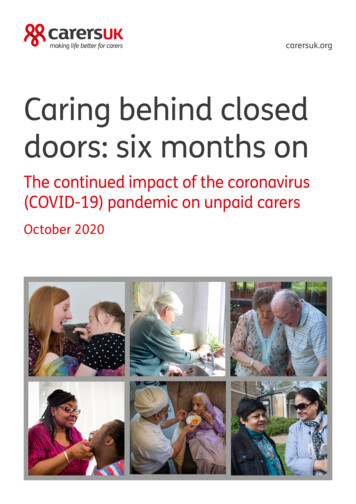
Transcription
carersuk.orgCaring behind closeddoors: six months onThe continued impact of the coronavirus(COVID-19) pandemic on unpaid carersOctober 2020
CARING BEHIND CLOSED DOORS: SIX MONTHS ON
CARING BEHIND CLOSED DOORS: SIX MONTHS ONContents04About this research05Foreword06Executive summary08The changing nature of care10Bereavement11Access to breaks and services13Health, wellbeing and emotional impact16Financial pressures17Impact on working carers19Use of technology20Positives of the pandemic21The support carers need23Conclusion and recommendations28Caring behind closed doors six months on in Scotland29Caring behind closed doors six months on in Wales30Caring behind closed doors six months onin Northern Ireland03
CARING BEHIND CLOSED DOORS: SIX MONTHS ONAbout this researchCarers UK carried out an online survey between 11thSeptember and 28th September 2020. A total of 5,904carers and former carers responded to the survey.This included 5,583 current carers and 321 formercarers. Compared to the carer population as a whole,respondents to this survey were more likely to befemale and caring for a high number of hours everyweek. As not all respondents completed every questionin the survey, a number of the figures given in thisreport, including those presented here, are based uponresponses from fewer than 5,904 carers.Of current carers who responded to the survey: 1% are 0-24, 3% are 25-34, 11% are 35-44, 26% are45-54, 35% are 55-64, 18% are 65-74 and 7% areaged 75 and over. 16% have childcare responsibilities for a non-disabledchild under 16. 80% identify as female and 19% identify as male. 4% describe their ethnicity as Black, Asian orMinority Ethnic (BAME). 3% identified as lesbian, gay or bisexual. 25% consider themselves to have a disability. 63% live in England, 13% live in Scotland, 10% livein Wales and 14% live in Northern Ireland. 36% have been caring 15 years or more, 15%between 10 to 14 years, 23% between 5-9 years, 22%between 1-4 years, 2% for less than a year and just1% since the beginning of the COVID-19 pandemic. 73% care for one person, 21% care for two people,5% care for three people and 2% care for four ormore people.04
CARING BEHIND CLOSED DOORS: SIX MONTHS ONForewordWinter is fast approaching, bringing with it colderweather and the usual pressures on health services.These survey results show that worrying about thecoming winter period is causing stress and anxiety forcarers, many of whom have had no break from caringfor many months and are reaching breaking point.The risk of burnout is especially concerning when somany carers are worried that there is no back-up orcontingency support available for the people they carefor, should they get ill.This research provides powerful evidence that theCOVID-19 pandemic continues to have a monumentalimpact on unpaid carers’ lives – not only because ofthe increased amount of care that many are havingto provide, but because of the far-reaching effect thatproviding this care is having on many aspects of their life;their relationships, their mental and physical health, theirpaid work and their emotional wellbeing. Our first Caringbehind closed doors report released in April 2020 providedshocking insight into the experiences of carers at a timeof national crisis, and this report shows the continuedseverity of that negative impact, six months on.Governments across the UK have taken a range ofactions to provide carers with help and support but thisreport shows how this support has fallen short and thatmore must be done. Comments shared in this surveyshow that many feel invisible and forgotten about andthat urgent action is needed to step up the supportthat is available. We need to give back to carers – theyare doing incredible things behind closed doors and theinvaluable part they play in the national effort againstCOVID-19 must be recognised and properly supportedthrough a New Deal for Carers.Whilst there have been positive innovations in techbased support for carers and some carers have greatlyenjoyed the slower pace of life due to the COVID-19pandemic, the vast majority have found life significantlymore difficult. A decrease in support and sometimescomplete closure of local services alongside an increasein care needs has led to most carers having to providemuch more care.Carers UK continues to do all we can to support carersand the people they care for at this challenging time.As always, we are hugely grateful to everyone whofills in our surveys and makes our research possible.We value the contribution of each and every one ofthe 5,904 carers who took time out of their busy lifeto share their story.This new report provides evidence of the intolerablepressure that carers are feeling and the exhaustionthey are facing. This echoes recent findings fromthe Alzheimer’s Society looking into the experienceof dementia carers1 and the Disabled Children’sPartnership’s research on parent carers2. Carers werealready seven times more likely to be lonely than theaverage person3, and recent restrictions and shieldinghave stripped away the support networks carers have,leaving many feeling isolated.Helen Walker, Chief Executive, Carers UK1 Alzheimer’s Society (2020) ‘Worst hit – dementia during coronavirus’2 Disabled Children’s Partnership (2020) ‘#LeftInLockdown – Parent carers’experiences of lockdown’3 Carers Week (2019) ‘Getting carers connected’05
CARING BEHIND CLOSED DOORS: SIX MONTHS ONExecutive summaryThere were up to 9.1 million unpaid carers across the UK before theCOVID-19 pandemic, providing everything from a few hours of support aweek to intensive and complex round the clock care.4 The pandemic hasresulted in millions of new carers – 4.5 million new to caring since the startof the pandemic, 2.8 million of whom are juggling work and care.5Caring can have significant costs, and without sufficientsupport it can take its toll on carers’ emotional andphysical health, ability to work and have a knock-oneffect on their long-term finances. Carers have been hitparticularly hard as a result of the COVID-19 pandemic.As this research shows many have had to makeextremely difficult decisions about work and family.81%of carers are providing more caresince the COVID-19 pandemicCarers are providing even more care thansix months ago40%Before the crisis, carers were already providingsubstantial hours of care. In April 2020, 70% wereproviding more care.6 Six months later this has increasedfurther; 81% of carers reported that they were providingmore care since the start of the outbreak for one ormore reasons. Two in five carers (40%) said they areproviding more care because the needs of the personthey care for have increased. 38% were providing morecare because of local services reducing or closing.of carers are providing more carebecause the needs of the personthey care for have increased38%Needs have increasedThe COVID-19 pandemic has changed the nation’slifestyle, with many services closed or reduced and anincrease in staying at home leading to a reduction inphysical activity. 8 out of 10 (78%) carers reported thatthe needs of the person they care for have increased sincethe COVID-19 pandemic. This has led to over half (58%)of carers feeling more stressed and, half saying it hadan impact on their health and wellbeing, as well as theirability to take a break.of carers are providing more carebecause of local services reducingor closing78%Fewer breaks and no breaks8 out of 10 carers said the needsof the person they care for haveincreased since the COVID-19pandemicAlmost two thirds of carers (64%) have not been ableto take any breaks from their caring role during theCOVID-19 pandemic. While one in five (19%) said thatthey had not been able to take as many breaks asthey felt they needed. A clear majority of carers (79%)selected at least one of these two options indicating thatthey had not been able to take any, or sufficient, breaks.4 Carers Week (2020) Carers Week Research Report56 Carers UK (2020) Caring Behind Closed Doors: the forgotten familiesof the coronavirus outbreakIbid7 Carers UK (2018) State of Caring 201806
CARING BEHIND CLOSED DOORS: SIX MONTHS ONWorse health and wellbeingDigital differencesCaring for someone can be challenging and manyprevious research reports have evidenced the impact oncarers’ physical and mental health.7 Alongside the usualstresses, the coronavirus outbreak has added additionalpressure. Almost two thirds of carers (64%) say that theirmental health has worsened as a result of the COVID-19pandemic. Just half (50%) of carers said that they feelable to manage their caring role at the moment, while22% are worried about being able to care safely due toa lack of knowledge, information or equipment.There has been a huge increase in the availability anduse of online services and digital technology. 33% ofcarers started using new technology and digital servicesduring the COVID-19 pandemic. But there is a growingdigital divide with 10% of carers reporting that theirability to use digital technology was limited becausethey struggled to afford things like equipment, WiFi ordata and this rose to 18% for carers who were strugglingfinancially.Some positives during caringWorried about winterDespite facing enormous pressure caring during theCOVID-19 pandemic, for some carers a simpler life andmore time connecting with family and friends have hada positive impact. Carers have been able to connectwith their local communities or religious or faith groupsagain, alongside having more time for leisure.Carers are worried about their ability to continue to careover winter and throughout the ongoing pandemic. Overhalf (57%) of carers are worried about what happens incase of emergency, as they do not have a contingencyplan in place. Over two thirds of carers (67%) areworried about how they would cope if further lockdownsor local restrictions were introduced.Exhausted and worn out64%Carers are struggling to continue caring and arereporting high levels of fatigue and stress, with almostthree quarters (74%) reporting feeling exhausted andworn out as a result of caring during the COVID-19pandemic. 44% of carers say they are reachingbreaking point.Two thirds of carers have not beenable to take any breaks from theircaring role during the COVID-19pandemicStruggling financiallyMany carers already faced very difficult financialsituations due to their caring responsibilities. Over aquarter of carers (28%) are struggling to make endsmeet. While more than one in ten respondents revealedthey were/had been in debt as a result of caring. Forthose in receipt of Carer’s Allowance, over a third (36%)are struggling to make ends meet.64%Almost two thirds of carers say thattheir mental health has worsened asa result of the COVID-19 pandemicWork – a mixed pictureJuggling work and care was challenging before thepandemic – now, a reduction in services and thenational shift to working from home has meantemployers and employees have had to adapt fast. Forsome working carers this has been beneficial. Despitethe government’s intervention in the labour market,11% of carers reported that they had reduced theirhours to manage their caring responsibilities, and 9%had given up work because of caring.74%Three quarters of carers are feelingexhausted and worn out from caringduring the COVID-19 pandemic07
CARING BEHIND CLOSED DOORS: SIX MONTHS ONThe changing nature of careEven before the COVID-19 pandemic, carers were providing substantiallevels of care with many caring around the clock. In our research in April2020, 70% of carers told us they were providing more care than normaland the results in this section show this has risen even further. Increased levels of careI was concerned that [the care workers] would bringCovid into the household and therefore cancelledthe care workers. My family are doing it betweenus instead until the pandemic is over or a vaccine isintroduced.”81% of carers reported that they were providing morecare since the start of the outbreak for one or morereasons – an 11% rise in only six months. Only 5% ofrespondents reported providing less care. It has been the hardest 6 months of my life and I amdreading another lockdown.”When asked for further details, two in five carers (40%)said they are providing more care because the needs ofthe person they care for have increased. Local servicesreducing or closing was another common reason forproviding more care, with 38% of respondents selectingthis option. 26% of carers said they are providing morecare because someone they rely on for breaks was nolonger available and 15% said they were providing morecare because they were worried about paid health andsocial care staff having contact with the person theycare for.There is nowhere for [my autistic children] to go as allsupport services are closed or online. This is hard onall our mental health.”Having to spend more time arranging the practicalside of Dad’s care and the emotional side has meantI’ve felt a lot more pressure juggling this with my paidwork and the family.”92% of BAME (Black, Asian and Minority Ethnic) carersreported that they were providing more care since thestart of the outbreak. The most common reason cited byBAME carers for providing more care was local servicesbeing reduced or closed (49%), with an increase inthe needs of the person they care for (42%) being thesecond most common reason.Changes in care needs and impact8 out of 10 (78%) carers reported that the needs of theperson they care for have increased since the COVID-19pandemic. Just 2% of carers reported that the needs ofthe person they care for have decreased since the startof the COVID-19 pandemic. Increased care needs havehad an impact on carers in a number of ways.77% of carers who are caring for their spouse/partnerreported providing more care since the start of thepandemic. In comparison, carers looking after a parent(82%) and parents caring for their disabled or ill son ordaughter (87%) were more likely to report an increasein the care they have provided since the start of theCOVID-19 pandemic.58% of carers reported that this increase has made themmore stressed. Half (51%) of carers report that this hadan impact on their health and wellbeing. Half (50%)of carers also reported that the increased needs of theperson they care for had impacted their ability to takea break, and 41% said the increase in care needs hadimpacted their relationship with the person they carefor. Almost half (49%) of working carers said that thisincrease had impacted on their ability to juggle paid workwith caring. Despite an increase in needs, there have beenchallenges in getting the right adaptations, even for thosewho had been waiting since before COVID-19.The survey findings indicate that carers are providingan average of 10 hours more care, with respondentsproviding 55 hours a week on average before the startof the pandemic and 65 hours a week since. Manywere caring around the clock for more than 90 hoursper week.08
CARING BEHIND CLOSED DOORS: SIX MONTHS ON The people I care for are more demanding than theyused to be, because we are around each other 24/7 itbecomes difficult to “like” each other and get along.”Some of the comments from carers suggest thatshielding had a detrimental impact on the mental andphysical health of people receiving care, which in turnmade things more difficult for them. His hearing has deteriorated and so has his speech.He finds it very hard to join in online socialising andoften declines. I feel he is losing contact/interest inhis family.”[The person I care for] became physically weaker.Their mental wellbeing suffered.” My husband still feels he needs to shield whichI understand. He has lost his confidence to go outwhich has impacted his mental health more.”During lockdown my mother’s mobility hasdecreased due to her not being able to do anyactivities . I am trying to work full time from herhome whilst caring for her and giving medicationsa district nurse would do.” It had a very negative impact on Mum, she was bored,agitated and felt I was keeping her a prisoner. Verysad time.”I feel very distant and concerned for my relative whois in a care home, I was a very regular visitor and fullyinvolved in supporting with their care (hair washing,nails etc.) – my concern is the lack of contact fornearly six months will have had a massive impacton their dementia and their wellbeing.”21% of carers said they were formally advised to shieldthemselves and many said that they found shieldinga stressful and lonely experience. 6% of those advisedto shield were unable to, with some of this group citingtheir caring role as the reason for not shielding, becausethey had no choice but to leave home to buy food andcollect medication for example. 22% of carers choseto shield due to worries about exposure to COVID-19.Many of those who shielded for another reason (14%)also cited that they did so to keep their family safe.Experiences of shieldingThree quarters (76%) of carers reported that the peoplethey care for shielded – more than a third (36%) ofthose receiving care shielded after being formallyadvised to, while a further 40% chose to shield dueto concerns about exposure to COVID-19 or anotherreason. Many of this latter cohort were people livingwith conditions or health issues not included on theGovernment’s shielded patients list, but who chose toshield for their own safety from the virus. I am more anxious about going out than I have everbeen in my life. My boundaries have narrowed. It isso lonely.”Whilst responses suggest that over half (51%) ofcarers shielded, responses also indicated that there isongoing confusion amongst carers about the meaningof shielding, with some stating that they shielded, butalso that they left their home for essentials.Just 2% of carers reported that people they caredfor who were advised to shield had not been able to.Within this group were carers who said their friends orfamily members struggled with their mental healthand needed to leave the home, or had a conditionsuch as Alzheimer’s Disease that meant they did notunderstand or remember the shielding rules.09
CARING BEHIND CLOSED DOORS: SIX MONTHS ONBereavementLosing the person they care for can be a devastating experience forcarers at any time and those who lost someone since the start of thepandemic shared their experience of how COVID-19 affected this difficulttime and the impact it had on them. Many carers shared that this hasbeen a very isolating experience. Mum died in April after coming out of hospital andstaying in a care home for about five weeks. She haddementia and didn’t understand that we couldn’tthen be with her during lockdown. Before that, whenshe had been in hospital we had visited her dailyso she must have felt abandoned and I think thishastened her death by months.”I feel that I am not able to grieve properly. Althoughsome equipment which mum used was takenaway quickly I still haven’t been able to dispose ofmedicines as our small local pharmacy does not haveenough available space. I still have controlled drugsat home.” I had a very upsetting phone call from the consultantexplaining that the only option [for my husband]was palliative care, it’s very hard receiving news likethis especially as I am by myself but also becauseof Covid no-one could give me a hug.”Waving at my terminally ill husband through thehospital window was devastating for both of us.To be allowed to be with him for only the last 40minutes of his life was useless to both of us, leavingme torn apart with inconsolable guilt and grief.” Because of Covid I had to [provide end of life care]virtually single handed, I found this very stressful asI wanted to let him die at home as he wished butI felt ill equipped to this. I am proud of myself thatI managed to do this but I don’t think I could havecoped for much longer by myself.”10
CARING BEHIND CLOSED DOORS: SIX MONTHS ONAccess to breaks and servicesCarers have a right to a life beyond their caring responsibilities but priorto the COVID-19 pandemic, research showed that 40% hadn’t had a dayoff for more than a year, and a quarter (25%) for more than five years8.Care and support services provide many carers with a break from caring,however, large numbers of these services have been unavailable inrecent months.Taking a break from caringA minority of respondents (27%) indicated that theyhad been able to take some sort of break during theCOVID-19 pandemic, with a variety of different reasonsprovided.Almost two thirds of respondents (64%) said that theyhad not been able to take any breaks from their caringrole during the COVID-19 pandemic, while one in five(19%) said that they had not been able to take as manybreaks as they felt they needed. A clear majority ofcarers (79%) selected at least one of these two optionsindicating that they had not been able to take any, orsufficient, breaks during the pandemic. I have been able to take a break when my familyor friends provide care (15%). I have been able to take a break because I formeda support bubble (3%). I have been able to take a break when the person Icare for goes to a day or other support service (4%).The reasons given by carers for why they had not beenable to take a break were wide ranging, with manypointing to lockdown or shielding restrictions, or notbeing able to rely as much on friends and family. It isclear that this has had a severe impact on them. I have been able to take a break when the person Icare for goes to overnight care services outside thehome (eg care homes) (2%). I have been able to take a break by accessing homecare support (4%).I have struggled hugely being with my husband24/7, unable to have a break from caring. There aretimes I think I can’t go on, but of course I have to.Sometimes I don’t want to wake up in the morning.” I have been able to take a break by accessing onlineactivities (3%). My usual activities like fitness class, carers cafe orother social activities either haven’t returned or havebeen limited, which were valuable to my wellbeing.”I used to get a break by family helping but as theyhave jobs and their own family they cannot riskhelping. It’s all down to me now.”I’m doing at least 14 hours of intense caring a day.I get an average of 5.5hrs sleep and eat most ofmy meals ‘on the move’. Never get to relax or reada book. With increasing restrictions, I can’t see myextended family at home, or visit a friend who is mymain support.”8 Carers UK (2017) State of Caring11
CARING BEHIND CLOSED DOORS: SIX MONTHS ONLimited access to support servicesCarers were also asked about their experiencesof accessing different support services duringthe COVID-19 pandemic and the impact thishas had. The responses show that many carersare still unable to access services which theypreviously relied on, as many of these have notreopened or returned yet, in their area.9This continuedthroughoutthe pandemicThis hasreopened/returned butI am gettinga lower levelof supportthan beforeThis hasreopened/returned andI am gettingthe same levelof supportas beforeThis hasreopened/returnedbut I am notusing itThis has notreopened/returned in myareaDay services9%24%8%10%49%Care Home23%12%7%23%35%Residential Care16%14%6%21%43%Specialist schools3%28%44%16%8%Before and/or after schoolprovision for a disabled child2%15%11%17%55%Activities provided by a localCarers Organisation11%15%4%8%61%Activities/support providedby a local charity (eg mealson wheels)11%12%3%9%65%Visits from paid care workers42%21%16%11%11%Sitting service16%13%19%16%36%3%16%7%13%62% Other breaks servicesI would normally get 84 respite nights per year. I’vebeen offered 12 between now and January 2021.Didn’t get any during lockdown. Day service shutduring lockdown but they did provide some supportand have now reopened but a shorter day.” I share the view of other carers in my situation thatwe are all crumbling if we can’t get a break of somekind. We also agree that our adult children want abreak away from us! Day services gave my son a life,friends, interests and often inspired him to do thingson his own. Now they have gone, he is bored, angry,a lot of shouting. It’s exhausting!” All respite provision has been withdrawn, no respitesince last December! Day care provision was 30hours a week, presently two hours twice a week withno transport provision.”9 Please note the table above includes only respondents who are serviceusers of this particular service, ie people who were using the service beforelockdown and/or are using it now12
CARING BEHIND CLOSED DOORS: SIX MONTHS ONHealth, wellbeing and emotional impactThe 2011 Census and the more recent GP patient survey by NHS Englandhave shown that carers were more likely than non-carers to have poorhealth before the COVID-19 pandemic10. Given the huge increase incaring being provided, and the fact that this is often without any breaks,it is unsurprising that carers are feeling the pressure and seeing anadditional impact on their own health and wellbeing.Health impact of the pandemic on carersLonelinessAlmost two thirds of carers (64%) say that their mentalhealth has worsened as a result of the COVID-19pandemic. This was significantly higher for carers whowere struggling financially (74%). 65% of women said theirmental health had suffered compared to 58% of men.Only 30% of respondents reported having a networkof people around them to support them, and 48%reported feeling lonely and cut off from people.This is perhaps due to the fact that less than half(48%) of carers feel they are able to keep in contactwith neighbours, family or members of their localcommunity.58% of carers say their physical health has worsenedas a result of the COVID-19 pandemic. This was slightlylower for men (54%) compared with (58%) of women,but carers who were struggling financially had seen ahigher impact on their physical health with 70% havingseen it worsen as a result of the pandemic.Carers who were struggling financially were more likelyto be facing loneliness with 19% saying they had anetwork of people around them and 62% saying theyfeel lonely and cut off from people. The impact of the pandemic on carers’ health is farreaching with 70% of carers having reduced theamount of physical activity they are taking part insince the start of the pandemic. This rises to 74% ofBAME carers and 74% of carers who said that they arestruggling financially. Only 29% of carers feel that theyhave been able to maintain their health and wellbeingduring the pandemic and only 43% have been able tomaintain a healthy diet.I am a shadow of what I was before going intolockdown. I am lonely, fed up and depressed, yetI can’t show these traits and must carry on mycaring duties, no matter what. It worries me thatcarers who are in the same position as myself willbe feeling the same and may do drastic things toescape.” I have had to stop my hobbies such as guitar lessons,my friend has not been able to visit, and these twothings gave me a chance to forget about my caringrole for a few hours. I have really missed being ableto talk to someone and feel very worried and anxiousbecause I have no-one to talk to.”My depression and anxiety have rocketed, I haven’tbeen able to follow a healthy diet and I haven’t hadchance to do any exercise the lockdown has ruinedso many things.” I am putting my health needs on a back burner asall my physical and mental energy goes on caring formy husband.”Mostly, I just feel really lonely. I don’t feel that I cantell people about my situation as I feel that it wouldbe disloyal somehow to Mum and I fear that peopleget bored listening to me moaning on.”I used to attend Pilates classes which helped withthe maintenance of my back and can no longer dothis. Someone needs to be here for Mum at all timesso I am unable to go out with my husband . Wehave looked after my Mum for 20 years and now feelthat life is passing us by.”10 Carers UK (2019) Facts about carers 201913
CARING BEHIND CLOSED DOORS: SIX MONTHS ONWorries about the future and contingencyExhaustionWhilst 50% of carers said that they feel able to managetheir caring role at the moment, 22% are worried aboutbeing able to care safely due to a lack of knowledge,information or equipment.Carers reported high levels of fatigue and stress,with almost three quarters (74%) reporting feelingexhausted and worn out as a result of caring during theCOVID-19 pandemic. Shockingly 44% of carers say theyare reaching breaking point.57% of carers are worried about what happens in case ofan emergency as they do not have a contingency plan inplace – this rises to 63% of carers who have not had anybreak since the start of the COVID-19 pandemic.Not having any break during the pandemic clearly hasan impact on levels of burnout, with 79% of carersin this position reporting feeling exhausted and wornout and half (50%) saying they are reaching breakingpoint. 51% of carers who reported that the needsof the person they care for have increased since thestart of the COVID-19 pandemic say they are reachingbreaking point.Over two thirds of carers (67%) are worried abouthow they would cope if further lockdowns or localrestrictions were introduced. This is higher for BAMEcarers, of whom 73% are worried about how theywould cope in this situation. 63% of carers are worried about how they will managethis winter with comments indicating that theyare worried about the impact of weather, seasonalillnesses, reduced chances to get outside and their ownhealth. This is higher for BAME carers (72%), carers whoare struggling financially (78%), working carers (66%)and carers who haven’t had any break since the startof the COVID-19 pandemic (66%).I am exhausted. I was caring for two people at thestart of the lockdown, sadly one person has nowpassed away, but the health of the second personhas deteriorated further so there is no let-up in theamount of caring required. 24/7 with no breaks.” I feel distraught and shattered everyday.”I still
CARING BEHIND CLOSED DOORS: SI MONTHS ON, EMBARGOED OBER, Worse health and wellbeing , Caring for someone can be challenging and many previous research reports have evidenced the impact on carers' physical and mental health.7Alongside the usual stresses, the coronavirus outbreak has added additional pressure.
